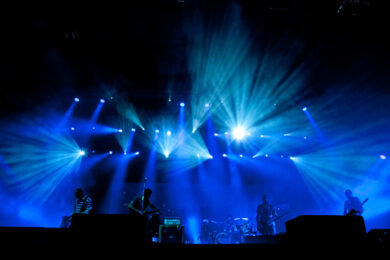Port Eliot, Edinburgh, Hay-On-Wye: the UK’s ever increasing love of literature and festivals is taking the country by force. But a lesser-known surge for literary festival fervour has just taken hold at the Off Festival in Katowice, Poland. While it has been known in the UK primarily as a music festival, OFF has made a bold attempt to revolutionise its line-up this month with offerings of literature and art.
This is all part of a project by officials from the Silesia region to highlight the cultural strengths of an otherwise little-known part of Poland – the local council have stressed support as part its mission to make the capital, Katowice, a European Capital of Culture in 2016.
This year’s musical programme sees sets by such Quietus favourites as Factory Floor, Omar Souleyman, Mogwai, Barn Owl, Konono No.1, Liars, Liturgy, and Oneida, but it’s at the on-site literature café that things really become curious. The book café is a tent that showcases figures of Polish art such as filmmaker Kazimierz Kurtz, who you might call the Martin Scorsese of the country’s film industry. The project manager of the literary tent says the festival is drawing support from key Polish culturephiles (Kurtz is a Government cultural advisor), which will lay the foundations for a bigger mix of literature of art at the event in future.
"We only started a literary corner last year as an experiment to see how people would react. Back then it was just a table where people could come to listen to readings," says curator, Wojciech Kuczok. "The surprise was more people were coming to see us than some of the bands, it was then obvious that this was something we wanted to take further."
But what is the Polish literary experience like? The literary tent is packed with seats from old cinemas, and filled with a heavy waft of intellectualism, in striking contrast to the Grolsch sponsorship outside.
"Now in Poland there’s a keen love of literature as a sense of escape," says Kuzcok. "The topics people focus on are very different to 20 years ago, then literature was about underground movements and intellectuals rebelling against the system. Now there’s a generation that’s grown up without the Iron Curtain, and people are finding freedom in expressing themselves, in much the same way it is in the West."
One thing that stands out about this compared to the UK is the attitude and sentiment of the crowd at the festival. People seem less concerned about wild hedonism and more keen to explore the myriad of acts. Such choice and eclecticism is a high in itself. There’s a sheer drive to connect with music and art, which takes precedent over the raucous abandon found in UK fields. Revellers can only drink in designated areas, and there’s no taking alcohol into the music arenas, which arguably leads to a more thoughtful contemplation of the music and art on offer.
The mastermind behind the festival is director Artur Rojek, a pioneer of Polish music in the 1980s and 90s. He explains Poland’s contemporary experience of music, art and literature was once not so easy to come by. This festival would have would have seemed like a far off fantasy in the 1990s, when the rest of Europe had a fully-fledged festival network.
"Back in the 90s western music was not so easy to find," Rojek says. "You could try your luck buying bootleg cassettes at an open air market, but new releases were rare, or you could ask friendly relatives in the west to send them."
The evolution of Polish alternative culture seems to have struggled against the odds with a feisty DIY attitude, and this festival is one of its results.
"People ask what are the key influences on Polish music and art," he continues, "and how it’s different to what’s going on elsewhere. The influences are similar, like fashion, but the context is different. It’s about inquisitive people finding out what it means to be an individual in an evolving country."
One place this is reflected is in an art installation mimicking the carpet-beating squares where communities used to congregate. "These used to be focal points where people used to meet," says Rojek, "but no longer exist, since most people have washing machines. The installation is a symbol of how we want groups of people to come together in the name of art. In future we want to embrace more art avenues."
Poetry is an influence on many of the musicians at OFF, such as Asi Mina, who uses poetry in her music, which she describes as "songs as stories". "Music is emotional language, so is poetry," Mina says. "Some of my music is inspired by writings, and it’s important [that] music is created from observations as much as politics and society."
At OFF, expressions of literature, art, music and culture are not considered separate entities, but part of the same vision for a brighter future. Not only do they bring colour to the present, but look set to create a new ideology of their own.
OFF Festival took place on the 5 to 7 August 2011, in Katowice, Poland
Header photo: Mogwai at OFF Festival, copyright Helen Boast 2011



